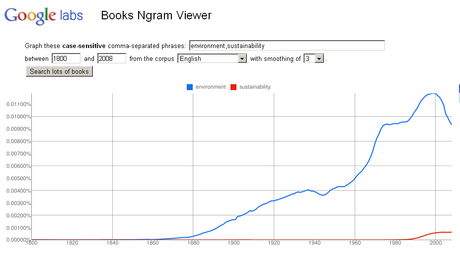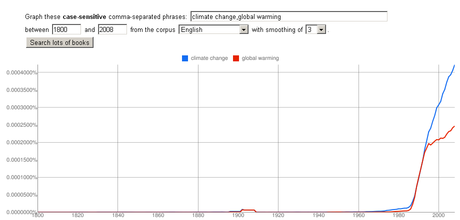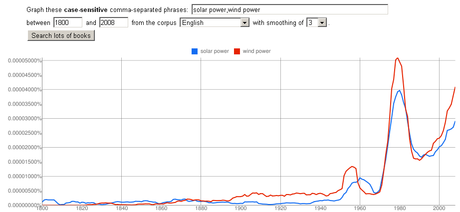
Here’s a fun little experiment: go to
http://ngrams.googlelabs.com/ and type in any set of words or phrases separated with commas. Google will then search through the 5.2 million books it has digitally stored on file to give you the frequency of the words’ appearance in the English language. The database covers the years 1500 to 2008.It’s a fascinating and addicting little game to play. Type in any two words, and interesting information and trends are reveled. For example, input “men” and “women” to see when the two terms became equal in number of mentions (around 1980) or put in “Barack Obama” to see a much anticipated surge in the 2000s. The goal of all this “is to give an 8-year-old the ability to browse cultural trends throughout history, as recorded in books,” according to Erez Lieberman Aiden, a junior fellow at the Society of Fellows at Harvard. He and Jean-Baptiste Michel, a postdoctoral fellow at Harvard, worked with Google to create the database and lead a research project on the Quantitative Analysis of Culture Using Millions of Digitized Books.What is also interesting and of more relevance to this website is what you can learn by moving into the realm of sustainability. For example, it is possible to track the increase in use of terms such as sustainability and environment, which took off in the 1960s and 1970′s with the beginnings of environmental movement (charts below). You can also see that “climate change” is becoming more fully accepted into the lexicon than “global warming”. This is a good sign for us here at 2nd Green Revolution as we think global warming is a misnomer. Just ask anyone who went through the blizzards of 2010 in Washington, DC if they think the earth is getting warmer. You’ll also see that “solar power” and “wind power” are referenced a surprisingly high amount even 100 years ago, showing that these are indeed older technologies getting a boost in popularity as money, research, and interest have made them more popular terms in the last several decades.What are some other interesting comparisons or trends that can be teased out from this massive data set?Here’s a good NY Times article on the massive database:
http://www.nytimes.com/2010/12/17/books/17words.html?_r=1

 Here’s a fun little experiment: go to http://ngrams.googlelabs.com/ and type in any set of words or phrases separated with commas. Google will then search through the 5.2 million books it has digitally stored on file to give you the frequency of the words’ appearance in the English language. The database covers the years 1500 to 2008.It’s a fascinating and addicting little game to play. Type in any two words, and interesting information and trends are reveled. For example, input “men” and “women” to see when the two terms became equal in number of mentions (around 1980) or put in “Barack Obama” to see a much anticipated surge in the 2000s. The goal of all this “is to give an 8-year-old the ability to browse cultural trends throughout history, as recorded in books,” according to Erez Lieberman Aiden, a junior fellow at the Society of Fellows at Harvard. He and Jean-Baptiste Michel, a postdoctoral fellow at Harvard, worked with Google to create the database and lead a research project on the Quantitative Analysis of Culture Using Millions of Digitized Books.What is also interesting and of more relevance to this website is what you can learn by moving into the realm of sustainability. For example, it is possible to track the increase in use of terms such as sustainability and environment, which took off in the 1960s and 1970′s with the beginnings of environmental movement (charts below). You can also see that “climate change” is becoming more fully accepted into the lexicon than “global warming”. This is a good sign for us here at 2nd Green Revolution as we think global warming is a misnomer. Just ask anyone who went through the blizzards of 2010 in Washington, DC if they think the earth is getting warmer. You’ll also see that “solar power” and “wind power” are referenced a surprisingly high amount even 100 years ago, showing that these are indeed older technologies getting a boost in popularity as money, research, and interest have made them more popular terms in the last several decades.What are some other interesting comparisons or trends that can be teased out from this massive data set?Here’s a good NY Times article on the massive database: http://www.nytimes.com/2010/12/17/books/17words.html?_r=1
Here’s a fun little experiment: go to http://ngrams.googlelabs.com/ and type in any set of words or phrases separated with commas. Google will then search through the 5.2 million books it has digitally stored on file to give you the frequency of the words’ appearance in the English language. The database covers the years 1500 to 2008.It’s a fascinating and addicting little game to play. Type in any two words, and interesting information and trends are reveled. For example, input “men” and “women” to see when the two terms became equal in number of mentions (around 1980) or put in “Barack Obama” to see a much anticipated surge in the 2000s. The goal of all this “is to give an 8-year-old the ability to browse cultural trends throughout history, as recorded in books,” according to Erez Lieberman Aiden, a junior fellow at the Society of Fellows at Harvard. He and Jean-Baptiste Michel, a postdoctoral fellow at Harvard, worked with Google to create the database and lead a research project on the Quantitative Analysis of Culture Using Millions of Digitized Books.What is also interesting and of more relevance to this website is what you can learn by moving into the realm of sustainability. For example, it is possible to track the increase in use of terms such as sustainability and environment, which took off in the 1960s and 1970′s with the beginnings of environmental movement (charts below). You can also see that “climate change” is becoming more fully accepted into the lexicon than “global warming”. This is a good sign for us here at 2nd Green Revolution as we think global warming is a misnomer. Just ask anyone who went through the blizzards of 2010 in Washington, DC if they think the earth is getting warmer. You’ll also see that “solar power” and “wind power” are referenced a surprisingly high amount even 100 years ago, showing that these are indeed older technologies getting a boost in popularity as money, research, and interest have made them more popular terms in the last several decades.What are some other interesting comparisons or trends that can be teased out from this massive data set?Here’s a good NY Times article on the massive database: http://www.nytimes.com/2010/12/17/books/17words.html?_r=1



